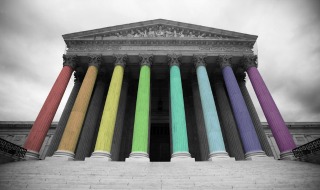Mathew D. Staver | Barbwire
Civil disobedience has a long and noble history in Western culture, and we will need a primer on it if, as seems likely, the Supreme Court rules against natural marriage in June.
Of course, civil disobedience is not justified just because we disagree with a human law, but only when that law conflicts with a higher revealed or Natural Law. When he was jailed for violating a law used to stop him from protesting injustice, Dr. Martin Luther King, Jr., wrote his famous Letter from Birmingham Jail. “A just law is a man-made code that squares with the moral law or the law of God,” he argued. “An unjust law is a code that is out of harmony with the moral law.”
He went on to say: “I would be the first to advocate obeying just laws. One has not only a legal but a moral responsibility to obey just  laws. Conversely, one has a moral responsibility to disobey unjust laws. I would agree with St. Augustine that ‘an unjust law is no law at all.’”
laws. Conversely, one has a moral responsibility to disobey unjust laws. I would agree with St. Augustine that ‘an unjust law is no law at all.’”
Such resistance is the very opposite of lawlessness. Dr. King set forth four steps to resist injustice: (1) gathering of facts, (2) negotiation, (3) self-purification and (4) direct action. We must learn more so we can see more. We have a duty to be informed. We must use all civil means to resolve the conflict. And, we must humbly seek the Lord before taking direct action.
Historical Precedent
Judeo-Christian history and the Western legal tradition agree with Dr. King. Sir William Blackstone wrote the definitive legal source used by British and American lawyers alike through the nineteenth century. In his Commentaries on the Laws of England, Blackstone wrote that “divine Providence” revealed His will through the “holy scriptures” and the “moral precepts” of revealed law. “Upon these two foundations, the law of nature and the law of revelation depend all human laws; that is to say, no human law should be suffered [permitted] to contradict these.” This natural law “is binding over all the globe in all countries, and at all times; no human laws are of any validity, if contrary to this.”
The Declaration of Independence refers to this same principle when it uses the words “laws of Nature and of Nature’s God” and declares that we are “endowed” by our “Creator with certain unalienable rights, that among these are Life, Liberty and the pursuit of Happiness.”
Merely because a legislature or a judge passes a law or issues an opinion does not make a law just. “To consider the judges as the ultimate arbiters of all constitutional questions [is] a dangerous doctrine indeed,” wrote Thomas Jefferson, “and one which would place us under the despotism of an oligarchy.” To cite an extreme example, if you lived under the Nazi regime and the law required you to not hide or aid a Jew in any way, would you comply with Hitler or obey God? To obey Hitler, you would have to disobey God.
Biblical Precedent
Scripture is replete with examples of civil authorities colliding with revealed or Natural Law. The Book of Hebrews says Moses was hid for three months because his parents “were not afraid of the king’s edict” (Heb. 11:23). In Daniel, the three Hebrews refused to bow down and worship the King of Babylon, and they were thrown into the fiery furnace from which God rescued them (Dan. 3:16-30). Ditto for Daniel in the lions’ den. Daniel could have prayed silently in his closet, but he openly disobeyed an unjust law and prayed so he could be heard (Dan. 6).
Prayer and preparation is essential. When Mordecai asked Esther to plead with the King of Persia for the Jewish people, she knew approaching the King without being summoned was illegal. She asked for her uncle, Mordecai, and the Jewish people to fast and pray for three days while she would do the same with others in the palace. Only then did she engage in direct action.
The Supreme Court Has Gotten It Wrong Before
The Supreme Court was wrong when it denied Dred Scott his rights and said, “blacks are inferior human beings.” And the Court was wrong when Justice Oliver Wendell Holmes wrote, “three generations of imbeciles are enough,” thus upholding Virginia’s eugenics law that permitted forced sterilization.
In these earlier cases, the definition of “human” was at issue. Now the definition of “marriage” is at issue. The Constitution does not grant a right to same-sex “marriage” — which is nonsensical since marriage intrinsically involves a man and a woman. Nor does the Constitution prohibit states from affirming the natural created order of male and female joined together in marriage.
The U.S. Supreme Court could still come off the rails in their June decision and invent a newfound right to “same-sex marriage,” striking down state laws that recognize the reality of marriage. If the Court takes that disastrous step, we should view it the same way history views the Dred Scott and Buck v. Bell decisions. Such a decision would fly in the face, not just of the Constitution itself, but of the natural created order.
What We Must Do
The temptation for many will be to cave or compromise. The temptation even for the faithful will be to retreat into our churches and cloisters. In 2004, same-sex “marriage” came to Massachusetts. Contrary to the claim that such laws would usher in an age of “tolerance,” the law immediately became a legal club to beat unwilling participants. Catholic charities bravely refused to place orphans in same-sex homes, because it was contrary to their mission.
Unfortunately, they stopped doing adoptions in the state. This cannot be our precedent. What they should have done is to say, “We are called to place orphans in homes with moms and dads. We will not voluntarily surrender our calling.” Massachusetts might have used force to stop Catholic charities anyway, just as lone florists and bakers are being driven to bankruptcy in other states. But what would happen if, instead of quiet retreat, many thousands of individuals, agencies, charities, churches and schools all came together, prepared, prayed and peacefully refused to countenance a Supreme Court decision that violates not only our highest legal document, but the laws of Nature and Nature’s God?
Perhaps we would see our culture step back from the brink of insanity, or perhaps we would suffer in the face of injustice. Whatever the outcome, the hour is late. It’s past time for us to get ready.
Mathew D. Staver is Chairman and Founder of Liberty Counsel®, an international nonprofit litigation, education, and policy organization dedicated to advancing religious freedom, the sanctity of life, and the family since 1989, by providing pro bono assistance and representation on these and related topics. With offices in Florida, Virginia and Washington, D.C., and an outreach in Israel, Liberty Counsel has hundreds of advocates around the world.




